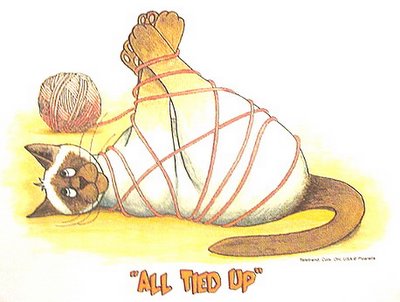
"I'll Try
We have allowed clichés to seep into our culture and consciousness and we tolerate them, despite the fact that they mean different things to different people. Consequently, our communication is stifled, confused, and often misunderstood.
A case in point: "I'll see you later." You will? How? You’re taking a plane to
Another example: "let's have lunch sometime." Oh? Actually, I expect to have lunch every-time; today, tomorrow, and probably the next day too. Did you mean that we ought to have lunch together? But you're flying to
And what about: "I'm sitting on pins and needles." Well for heavens sake, get up! That's got to be mighty painful, all those pins and needles. And there you are, sitting on them?!
And finally, for now: "I'm all tied up." As in, "I'd love to go to lunch with you but I'm all tied up." You are? Would you like me to call the police? Are you tied up of your own free will? Or has someone done this to you? Is this a daily occurrence?
These expressions and clichés are not really bothersome for us locals, because we've learned to read between the lines. But we need to realize that our language, English, has become a global form of communication -- especially with the Internet. Using clichés in an international arena can cause much confusion. The gentleman from Bolivia, or the woman from Indonesia, who have struggled to master the English-language, just get more confused when they have to decide about taking lunch sometime with someone who is sitting on pins and needles and all tied up.
No comments:
Post a Comment